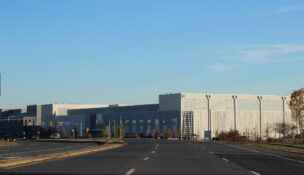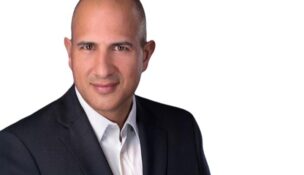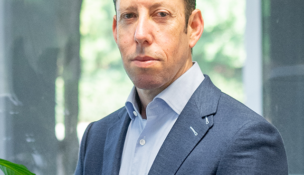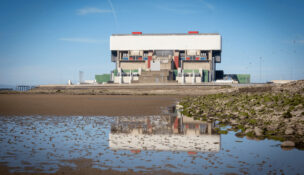Keeping aim on the governor’s goals
Domenech says Chesapeake Bay improving, but diminishing groundwater raises concern.
Keeping aim on the governor’s goals
Domenech says Chesapeake Bay improving, but diminishing groundwater raises concern.
Douglas W. Domenech is responsible for maintaining the commonwealth’s environmental quality while pushing efforts to develop new energy resources off Virginia’s coast.
“Our goals are the governor’s goals,” says Domenech, who has been secretary of natural resources under Gov. Bob McDonnell since January 2010. “It was pretty clear from the beginning that the governor was interested in a couple of key environmental goals. [They included] improving the health of the Chesapeake Bay and land conservation, continuing the effort to conserve open space in Virginia. Then a third [goal] is pursuing an all-of-the-above energy strategy,” including offshore wind, oil and natural gas.
Entering the administration’s last year, Domenech says progress has been made on many of these goals: the bay is healthier, 156,000 acres have been preserved, and Virginia is within months of the nation’s first offshore wind lease sale.
But Domenech says one concern has worried him and many of his predecessors. “There is an environmental challenge … which impacts communities and economic development,” he says. “That is the coming problems or potential problems with our groundwater supply in the eastern part of the state, from I-95 east. We monitor that aquifer, and we have been noticing for many years that it’s not recharging as fast as it’s being used.”
McDonnell has put additional funds in the state budget to monitor the aquifer. “It’s something that may not be an issue for 10 years and maybe not even for 20, but it is an issue of concern for us,” Domenech says.
Meanwhile, Domenech and other state officials still are trying to develop more offshore energy sources. The expected federal lease sale of oil and natural gas sites off the Virginia coast was postponed after the Deepwater Horizon oil spill in the Gulf of Mexico in 2010. Now the U.S. Department of Interior has scheduled the sale to take place during a five-year plan that doesn’t begin until 2017. The McDonnell administration wants that timetable to be moved up.
A graduate of Virginia Tech, Domenech was senior vice president of Artemis Strategies, a Washington, D.C.,-based government relations and strategic communications firm, before being appointed to McDonnell’s cabinet. He was a senior official in the U.S. Department of Interior throughout the presidency of George W. Bush. From November 2005 to January 2009, he was deputy chief of staff for Interior Secretaries Gale Norton and Dirk Kempthorne.
As secretary of natural resources, Domenech oversees six state agencies: the departments of Environment Quality, Conservation and Recreation, Historic Resources, Game and Inland Fisheries and Marine Resources plus the Virginia Museum of Natural History in Martinsville. Virginia Business talked with Domenech at his office in the Patrick Henry Building off Capitol Square in Richmond on Feb. 26. Attending the interview were Deputy Secretaries Maureen Matsen and Anthony Moore.
Below is an edited transcript. A video of the interview is available at www.VirginiaBusiness.com.
Virginia Business: What sort of accomplishments do you chalk up [for the past three years]?
Domenech: We really have made remarkable gains in the health of the Chesapeake Bay. I say that not only on the regulatory side…. Working on voluntary efforts with farmers and industry has made an enormous difference. … The bay is becoming healthier. We think we have worked hard to make that happen. …
EPA has provided us a number of awards. We won the biggest-loser award for reducing the amount of nitrogen and phosphorous that goes into the bay, so that was a big accomplishment for us. In addition, after 15 years, the governor has been able to work with the [Army] Corps of Engineers to get the sea wall built at Tangier Island. …
In this General Assembly we were able to pass legislation to consolidate some of our water quality programs into one program. That will be a great benefit to the people who have to get permits. …
We’ve been able to add about 156,000 acres to the open space easement program. …
On the energy side, we created several permits by rule, which makes it much easier for folks who want to develop a wind project or a solar project to meet the criteria. They know exactly what they need to meet, and if they meet it, they get the permit. …
As part of that all-of-the-above energy strategy, we’ve worked on nuclear generation, coal, gas, offshore wind, onshore wind and Outer Continental Shelf oil and gas. We’ve been working on really everything, including efficiency, gas from landfills, you name it. …
On the offshore wind side … we have worked very closely with all of the interests that are offshore — the maritime industry, the defense industry — to allow space for that wind generation. … This year we should have the first offshore wind lease sale. … That’s very exciting, and we think it’s a great opportunity for the port, for people who make these wind turbines. We think we have a robust industry down there that’s prepared to do it, and that makes a big difference. …
The governor was instrumental in creating the Outer Continental Shelf Governors Coalition of all the states that have any sort of coastal presence [on the East Coast and the Gulf of Mexico]. We’re working very hard with [the Department of] Interior to get our offshore oil and gas lease. …
We have had a couple opportunities to promote the water quality improvements in the budget. This past General Assembly just approved $216 million in wastewater bonds. That money will go to an existing [Department of Environmental Quality] program to help municipalities with wastewater treatment facility upgrades. …
In addition, we’ve created a new $35 million matching grant fund to help communities with storm water. This will help them with the infrastructure improvements that they need to make for storm water.
VB: What sort of things did you want to get done that you know won’t be done by the time you leave and will be left for the next administration?
Domenech: That’s an interesting question. … There is an environmental challenge … which impacts communities and economic development. That is the coming problems or potential problems with our groundwater supply in the eastern part of the state, from I-95 east. We monitor that aquifer, and we have been noticing for many years that it’s not recharging as fast as it’s being used. …
At a conference, Environment Virginia, which is held out at VMI, I had a panel discussion last year, and I invited the previous four secretaries [of natural resources] … and I asked them: What do you think is the biggest environmental challenge facing Virginia? They all said the same thing, which was groundwater.
It is a problem that will create pressures on current industries to maybe think more creatively about how to use different kinds of water. Do they have to use groundwater? A lot of industrial processes could use what we call greywater, water that hasn’t been treated but could be perfectly fine for their use. So groundwater is a big issue, and we have tried to sound the alarm. The governor put money in his budget to create some additional monitoring of that aquifer. It’s something that may not be an issue for 10 years and maybe not even for 20, but it is an issue of concern for us.
VB: Is it simply that there are more people or more industries using that water, and that it’s just not replenishing itself?
Domenech: It’s probably that plus water patterns. … We’re cognizant of that and have worked with our economic development team to say that before we reach out to companies to come in, we really need to work with them to see if there are alternative ways to give them the water they need in order to promote economic development.
VB: Do you think this would lead to any kind of water restrictions at any point?
Domenech: It could at some point, but we’re not near there now.
VB: What has your relationship been with the EPA?
Domenech: Well, I don’t think it’s changed. … We work with them across many issues: the bay, air quality, other water-quality-related things. We have the brown fields program, which is a continuing issue. …
Of course we’ve been involved in and supported the attorney general’s [and Fairfax County’s] lawsuit on Accotink [Creek watershed in Fairfax]. … The law allows EPA to regulate certain pollutants like nitrogen and phosphorous sediment, but what they tried to do is create a TMDL that was really based on the flow of water. [“Total maximum daily load” (TMDL) is a regulatory term describing the maximum amount of a pollutant allowed in a body of water while still meeting water quality standards.]
Water itself became the pollutant. That’s really what the lawsuit was about. It basically was saying we understand environmental protection, and we’re not opposed to that at all, but you can’t go beyond your authority and try to make water a pollutant. [The EPA decided in March it would not appeal a federal district court’s ruling in January that the agency had illegally overreached its authority.]
VB: Going back to offshore oil and natural gas, I saw that the governor was one of several governors sending a letter to the nominee for the [U.S. Department of the] Interior [Sally Jewell, the CEO of Recreational Equipment Inc. in Seattle] asking for movement on oil and natural gas. Do you have any indication that with her coming on board that policies are going to change?
Domenech: I think it’s too soon. She interestingly enough has an engineering background and used to work for Mobil Oil. … Some people say she has a very green background. I would say she has a very outdoor recreation background. She’s very much into hiking and camping and that kind of stuff, which is a little bit different than just having a strictly environmental view.
VB: Some of your agencies have been involved in looking at whether the state is ready to regulate uranium mining if the ban is ever lifted. How confident are you that the state could regulate uranium mining if the ban was lifted?
Domenech: I’m very confident that we could do it, but my confidence shouldn’t be read as saying we should do it. Virginia really has an outstanding set of agencies that care deeply about the environment. Department of Environmental Quality, Department of Health and the Department of Mines, Minerals and Energy are the three agencies that came together and basically did the work to say that, if we did it, what are the issues that would have to be regulated? I think if the General Assembly and the governor ever came to the conclusion that uranium mining should happen I’m pretty confident we could regulate it. Whoever does it would have to meet that regulatory burden.
VB: Now we talked about wind energy, and how that’s a possibility. What is the state doing on its side to encourage wind energy?
Domenech: VOWDA [the Virginia Offshore Wind Development Authority] worked to site the first lease in a way that works for everybody. Then we worked to do the environmental work offshore, working with Interior to get that done. Interior then puts out what they call a request for information where companies indicate if they’re interested in bidding. They qualify those bidders. … [Ten] separate companies have expressed an interest in bidding for the lease. The BOEM, Bureau of Ocean Energy Management, at Interior, will announce their intention to hold a lease sale. I think there’s a 60-day comment period, and then there’s the lease.
We’re very anxious to see what happens with that. The country has never had one of these. This is groundbreaking stuff, so we don’t know how the leases will work and have no idea what kind of money might be involved at this point. Obviously, the federal government is trying very hard to accommodate this form of energy development, and we’re happy to accommodate that. We think Virginia’s the right place to do it. That’s sort of the status.
Matsen: Not in this year’s budget effort but last year’s budget effort we got $500,000 to commit to developing offshore wind and $300,000 of that is being used to partner with the Department of the Interior, BOEM, for matching funds to do the surveys of the bottom of the ocean in our wind area. That will help reduce costs for developers because it eliminates one of the areas of risk. They’ll actually know what’s going on at the bottom of the ocean.
This year the General Assembly was generous enough to commit another $1 million. VOWDA has a wish list of things to do with that money. We’ve done transmission studies. Dominion has done two transmission studies to examine the interconnects when you come onshore [with wind-generated power] and also to examine what sort of transmission you would want for developing those projects. That’s been an important element of what we’ve done.
VOWDA really is an exceptional group of experts that stay on top of all of the new advancements that are going on. Dominion recently just won a $4 million grant from DOE and the state is part of that grant. Alstom [Power Inc.] is a partner and there are several other partners to look at wind turbine foundations. Again this is part of DOE’s broad effort to bring the cost of offshore wind down because everybody recognizes that right now those costs are prohibitive. If you can develop a foundation that is cheaper and more useful and will withstand the various vagaries of pressure it has to sustain out in the ocean, that can reduce your costs and reduce your risk, and risk is a big cost.
VB: We’ve talked about your relationship with the EPA. What sort of relationship have you had with the environmental community?
Domenech: I think “the environmental community” is a very broad statement. We have some, like the Chesapeake Bay Foundation and the James River Association here in town, [that have] put out releases in the last few weeks just congratulating the governor for all the water quality-related things. We’ve worked a lot with those groups because we’re pulling in the same direction. There are some groups in the state that don’t really want to talk about how we work on recurrent tidal issues. They just want to talk about why they hate coal and how that somehow impacts the climate. That’s a much deeper discussion, and I think it’s pretty clear that scientists disagree a little bit on that. I think we’ve tried to focus our efforts on really what we’re supposed to be doing in the state to prepare for [rising] sea level or whatever it is. We need to be able to adapt to those things and work with them. The environmental community has been mixed, but we have great friends. We work with them all the time on different issues. It’s largely very cooperative. There are a few on the fringe [that are] not cooperative.
VB: [My understanding from a recent article is] the governor and his administration don’t deny climate change is happening but you’re not ready to say it’s all because of manmade causes.
Domenech: I would say the governor believes that the climate is changing, and scientists are working on why it’s changing. It’s clearly changed in the past. I use the example that one of our agencies, the Virginia Museum of Natural History, is digging up eobalaenoptera [an extinct species of whales] north of Richmond.
… So we know the oceans were a lot higher in the past, way before we were driving SUVs. But also at the same time, the Department of Historic Resources is working on new finds that actually lead them to believe that there were villages as far out as 50 miles into the ocean. In other words, the ocean had receded. I’m just saying science continues to find this stuff. We should study it. We should study it honestly. We should not be biased in one direction or the other.



















